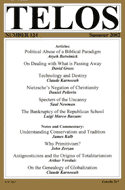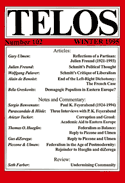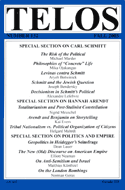By Maja Sidzinska · Thursday, October 17, 2013 As an occasional feature on TELOSscope, we highlight a past Telos article whose critical insights continue to illuminate our thinking and challenge our assumptions. Today, Maja Sidzinska looks at James Kalb’s “Understanding Conservatism and Tradition,” from Telos 124 (Summer 2002).
 Let’s start with the punch-line: James Kalb informs us, in his article “Understanding Conservatism and Tradition,” that “the modern emphasis is too much on technology, on breaking things down to their simplest parts and reconstructing them in accord with human will. The problem with applying that approach to human life as a whole is that one can make sense of one’s actions only by reference to standards and realities one does not create” (164). In Kalb’s view, tradition creates these standards and realities, and is irreplaceable in this role. He compares the role of tradition to the roles of bureaucracy and markets, and he holds these three operative approaches as constitutive of politics, public policy, and life more generally. Let’s start with the punch-line: James Kalb informs us, in his article “Understanding Conservatism and Tradition,” that “the modern emphasis is too much on technology, on breaking things down to their simplest parts and reconstructing them in accord with human will. The problem with applying that approach to human life as a whole is that one can make sense of one’s actions only by reference to standards and realities one does not create” (164). In Kalb’s view, tradition creates these standards and realities, and is irreplaceable in this role. He compares the role of tradition to the roles of bureaucracy and markets, and he holds these three operative approaches as constitutive of politics, public policy, and life more generally.
Continue reading →
By Johanna K. Schenner · Tuesday, October 8, 2013 As an occasional feature on TELOSscope, we highlight a past Telos article whose critical insights continue to illuminate our thinking and challenge our assumptions. Today, Johanna Schenner looks at Alain de Benoist’s “The End of the Left-Right Dichotomy: The French Case,” from Telos 102 (Winter 1995).
 In his article “The End of the Left-Right Dichotomy: The French Case,” Alain de Benoist points to the gradual disappearance of traditional political ideologies in both socialist and conservative parties. In fact, Sofres Polls support this statement: in March 1981, 33% of the population viewed this delineation as outdated; in February 1986, 45% of the population shared this view; in March 1988, this proportion reached a new record level of 48%; and eventually in November 1989, more than half of the French population deemed this ideological antagonism as obsolete (73). In his article “The End of the Left-Right Dichotomy: The French Case,” Alain de Benoist points to the gradual disappearance of traditional political ideologies in both socialist and conservative parties. In fact, Sofres Polls support this statement: in March 1981, 33% of the population viewed this delineation as outdated; in February 1986, 45% of the population shared this view; in March 1988, this proportion reached a new record level of 48%; and eventually in November 1989, more than half of the French population deemed this ideological antagonism as obsolete (73).
Continue reading →
By Stuart McAnulla · Thursday, August 22, 2013 The following paper was presented at the Seventh Annual Telos Conference, held on February 15–17, 2013, in New York City.
 The banking crisis of 2007–8 became interpreted by many commentators as a failure of the neo-liberal economics that had been internationally ascendant for approximately three decades. Following the government bailout of the banks, even some leading evangelists for laissez-faire capitalism, such as Alan Greenspan, came to reflect on “flaws” within their ideology.[1] The younger Greenspan had been a disciple of Ayn Rand, whose fiercely individualistic philosophy had been popularized in her best-selling novels The Fountainhead (1943) and Atlas Shrugged (1957).[2] Yet the political fallout from the banking crisis provoked a resurgence of interest in Rand’s work,[3] with some on the political Right arguing the crisis had actually been provoked by state involvement in the economy. It was contended that the U.S. government had believed that large financial institutions were “too big to fail,” thus emboldening actors within these organizations to take far greater risks than they would otherwise have contemplated. In this regard Ayn Rand has even been referred to as a prophet of the crisis. Rand argued that government control over the economy would tend to induce deep problems that would then be blamed on the free-market and the avarice of businessmen. Consequently, demands would then be made for greater government control and more public spending. However (and as the plot transpires in Atlas Shrugged), these interventions only serve to make economic conditions worse as the creativity of entrepreneurs is further stifled by regulation. This explanation of the crisis has been influential within the renewal of the populist Right, evident in the “Who is John Galt?” banners that have appeared at numerous Tea Party events and anti-Obama protests. The banking crisis of 2007–8 became interpreted by many commentators as a failure of the neo-liberal economics that had been internationally ascendant for approximately three decades. Following the government bailout of the banks, even some leading evangelists for laissez-faire capitalism, such as Alan Greenspan, came to reflect on “flaws” within their ideology.[1] The younger Greenspan had been a disciple of Ayn Rand, whose fiercely individualistic philosophy had been popularized in her best-selling novels The Fountainhead (1943) and Atlas Shrugged (1957).[2] Yet the political fallout from the banking crisis provoked a resurgence of interest in Rand’s work,[3] with some on the political Right arguing the crisis had actually been provoked by state involvement in the economy. It was contended that the U.S. government had believed that large financial institutions were “too big to fail,” thus emboldening actors within these organizations to take far greater risks than they would otherwise have contemplated. In this regard Ayn Rand has even been referred to as a prophet of the crisis. Rand argued that government control over the economy would tend to induce deep problems that would then be blamed on the free-market and the avarice of businessmen. Consequently, demands would then be made for greater government control and more public spending. However (and as the plot transpires in Atlas Shrugged), these interventions only serve to make economic conditions worse as the creativity of entrepreneurs is further stifled by regulation. This explanation of the crisis has been influential within the renewal of the populist Right, evident in the “Who is John Galt?” banners that have appeared at numerous Tea Party events and anti-Obama protests.
Continue reading →
By Frederick Wertz · Tuesday, December 11, 2012 As an occasional feature on TELOSscope, we highlight a past Telos article whose critical insights continue to illuminate our thinking and challenge our assumptions. Today, Frederick Wertz looks at Elliot Neaman’s “The New (Old) Discourse on the American Empire and the War in Iraq” from Telos 132 (Fall 2005).
 Critiques of American imperialism are easy to find at the domestic and the international level, especially in today’s partisan and reactionary political climate. The contemporary discourse is beginning to focus on the decline of the American empire, despite the fact that there is very little consensus as to whether or not America ever even had an empire to begin with, in any objective historical context. Critiques of American imperialism are easy to find at the domestic and the international level, especially in today’s partisan and reactionary political climate. The contemporary discourse is beginning to focus on the decline of the American empire, despite the fact that there is very little consensus as to whether or not America ever even had an empire to begin with, in any objective historical context.
In an article written in the midst of a heated debate about American imperialism and the War in Iraq, Elliot Neaman takes a step back from the fray and takes a look at the development of the contemporary discourse surrounding the issue. While the debate may or may not have evolved significantly from where it was in 2005, Neaman’s analysis of various critiques of American empire has enduring aspects that pertain far beyond the scope of American foreign policy. By looking at various pro- and anti-empire positions from both the Left and Right, we can draw meaningful lessons about the development of discourse and the interpretation of history.
Continue reading →
By Andre Freudenberg · Thursday, December 6, 2012 No doubt, there are successful moderate right-wing conservative parties all over Europe. Their names may be different, but they have one thing in common: they grow stronger while forcing government to alter policies and solve problems caused by illegal immigration and tendencies toward more centralization within the European Union. Therefore, it becomes more and more difficult to eliminate public debate about those and other topics.
However, there is one big exception: Germany. A party comparable to the Austrian Freedom Party still doesn’t exist there. The five “big players” that are represented in the Bundestag (the national parliament) and in the Landtag (the federal state parliaments) are either left-wing or at the center. One example is the Christian Democratic Union (CDU), which is part of the current government coalition together with the Free Democratic Party (FDP). One may assume that only a small minority of the electorate sympathizes with the agenda of staunchly conservative groups. But surveys conducted last year strongly refute this assumption.
Continue reading →
|
|
 Let’s start with the punch-line: James Kalb informs us, in his article “Understanding Conservatism and Tradition,” that “the modern emphasis is too much on technology, on breaking things down to their simplest parts and reconstructing them in accord with human will. The problem with applying that approach to human life as a whole is that one can make sense of one’s actions only by reference to standards and realities one does not create” (164). In Kalb’s view, tradition creates these standards and realities, and is irreplaceable in this role. He compares the role of tradition to the roles of bureaucracy and markets, and he holds these three operative approaches as constitutive of politics, public policy, and life more generally.
Let’s start with the punch-line: James Kalb informs us, in his article “Understanding Conservatism and Tradition,” that “the modern emphasis is too much on technology, on breaking things down to their simplest parts and reconstructing them in accord with human will. The problem with applying that approach to human life as a whole is that one can make sense of one’s actions only by reference to standards and realities one does not create” (164). In Kalb’s view, tradition creates these standards and realities, and is irreplaceable in this role. He compares the role of tradition to the roles of bureaucracy and markets, and he holds these three operative approaches as constitutive of politics, public policy, and life more generally.  In his article
In his article  The banking crisis of 2007–8 became interpreted by many commentators as a failure of the neo-liberal economics that had been internationally ascendant for approximately three decades. Following the government bailout of the banks, even some leading evangelists for laissez-faire capitalism, such as Alan Greenspan, came to reflect on “flaws” within their ideology.[1] The younger Greenspan had been a disciple of Ayn Rand, whose fiercely individualistic philosophy had been popularized in her best-selling novels The Fountainhead (1943) and Atlas Shrugged (1957).[2] Yet the political fallout from the banking crisis provoked a resurgence of interest in Rand’s work,[3] with some on the political Right arguing the crisis had actually been provoked by state involvement in the economy. It was contended that the U.S. government had believed that large financial institutions were “too big to fail,” thus emboldening actors within these organizations to take far greater risks than they would otherwise have contemplated. In this regard Ayn Rand has even been referred to as a prophet of the crisis. Rand argued that government control over the economy would tend to induce deep problems that would then be blamed on the free-market and the avarice of businessmen. Consequently, demands would then be made for greater government control and more public spending. However (and as the plot transpires in Atlas Shrugged), these interventions only serve to make economic conditions worse as the creativity of entrepreneurs is further stifled by regulation. This explanation of the crisis has been influential within the renewal of the populist Right, evident in the “Who is John Galt?” banners that have appeared at numerous Tea Party events and anti-Obama protests.
The banking crisis of 2007–8 became interpreted by many commentators as a failure of the neo-liberal economics that had been internationally ascendant for approximately three decades. Following the government bailout of the banks, even some leading evangelists for laissez-faire capitalism, such as Alan Greenspan, came to reflect on “flaws” within their ideology.[1] The younger Greenspan had been a disciple of Ayn Rand, whose fiercely individualistic philosophy had been popularized in her best-selling novels The Fountainhead (1943) and Atlas Shrugged (1957).[2] Yet the political fallout from the banking crisis provoked a resurgence of interest in Rand’s work,[3] with some on the political Right arguing the crisis had actually been provoked by state involvement in the economy. It was contended that the U.S. government had believed that large financial institutions were “too big to fail,” thus emboldening actors within these organizations to take far greater risks than they would otherwise have contemplated. In this regard Ayn Rand has even been referred to as a prophet of the crisis. Rand argued that government control over the economy would tend to induce deep problems that would then be blamed on the free-market and the avarice of businessmen. Consequently, demands would then be made for greater government control and more public spending. However (and as the plot transpires in Atlas Shrugged), these interventions only serve to make economic conditions worse as the creativity of entrepreneurs is further stifled by regulation. This explanation of the crisis has been influential within the renewal of the populist Right, evident in the “Who is John Galt?” banners that have appeared at numerous Tea Party events and anti-Obama protests.  Critiques of American imperialism are easy to find at the domestic and the international level, especially in today’s partisan and reactionary political climate. The contemporary discourse is beginning to focus on the decline of the American empire, despite the fact that there is very little consensus as to whether or not America ever even had an empire to begin with, in any objective historical context.
Critiques of American imperialism are easy to find at the domestic and the international level, especially in today’s partisan and reactionary political climate. The contemporary discourse is beginning to focus on the decline of the American empire, despite the fact that there is very little consensus as to whether or not America ever even had an empire to begin with, in any objective historical context. 






